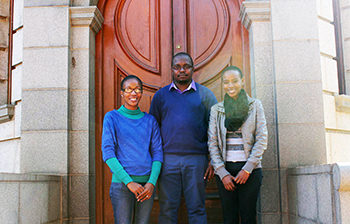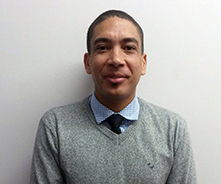Latest News Archive
Please select Category, Year, and then Month to display items
31 January 2018
Photo FNB Varsity Cup
 Lubabalo Dobela, Shimlas flyhalf (with the ball), played a key role in the Shimlas’ win over Tuks in the first round of the 2018 Varsity Cup.
Lubabalo Dobela, Shimlas flyhalf (with the ball), played a key role in the Shimlas’ win over Tuks in the first round of the 2018 Varsity Cup.
The Shimlas made a huge statement in their opening match of the 2018 Varsity Cup when they defeated last year’s champions at the Tuks Rugby Stadium in Pretoria.
The Free State students won the encounter against Tuks by 19-17 on Monday.
Tuks, who beat Shimlas twice last year, first in the group stage by 65-19, and then by 28-21 in the semifinals, were regarded as the hot favourites. The match was played in wet conditions which many thought would suit the home team better.
Determination carries team to win
But a young and inexperienced Shimlas team with 11 players making their debut in the competition proved that big hearts and guts count for just as much. It was only their third win in Pretoria in the 11th year of the competition and their second victory over Tuks since 2012.
As expected, both teams tightened up their approach. Shimlas struck back from a 0-5 deficit soon after the first strategy break as big and speedy wing Francois Agenbag stormed down the touchline to score a seven-point try. Flyhalf Lubabalo Dobela was on hand to convert and hand his team a 9-5 lead at the break.
Flyhalf stars in debut
The Shimlas extended their lead within five minutes of the restart as flank Benji Janse van Vuuren crashed over in the corner for a converted try. Dobela, one of the debutants who was named Player that Rocks (Player of the Match), controlled the match like a seasoned veteran. Apart from two difficult conversions from the touchline, he also slotted a penalty goal.
nGAP lecturers welcomed by the UFS academic community
2016-06-30

University of the Free State’s newly-appointed nGAP
lecturers. From the left, Neo Mathinya,
Phumudzo Tharaga, and Kelebogile Boleu.
The University of the Free State (UFS) was allocated six positions as part of the Department of Higher Education and Training (DHET) New Generation of Academics Programme (nGAP). Four candidates have filled positions in the Faculty of Health Sciences, Faculty of the Humanities and the Faculty of Natural and Agricultural Sciences – with two positions still vacant.
According to Minister of Higher Education and Training, Dr Blade Nzimande, nGAP is part of the Staffing South Africa's Universities Framework, which focuses on the expansion of the size and compilation of academic staff at South African universities, especially with regard to transformation. The focus of the programme is the appointment of black and coloured candidates as well as women.
The Department of Soil, Crop, and Climate Sciences in the Faculty of Natural and Agricultural Sciences welcomed two nGAP lecturers, Phumudzo Tharaga and Neo Mathinya. The Faculty was allocated four positions. Two positions are filled, while two positions in the Department of Animal and Wildlife Sciences are almost ready to be filled with exceptional candidates.
Agrometeorologist with his feet on the ground
Phumudzo Tharaga holds an MSc from the UFS, and is currently pursuing a PhD. Tharaga’s research focuses on quantifying the water use efficiency of sweet cherry orchards under different climate conditions in the Eastern Free State. Tharaga will offer his students a wealth of practical experience, which he began accumulating while working at ABSA as an agro-meteorologist, before moving on to become a senior scientist at the South African Weather Service. In 2015, Tharaga became a research technologist at the Council for Scientific and Industrial Research (CSIR) and then returned to the UFS as an nGAP candidate at the beginning of 2016.

Beynon Abrahams, nGap lecturer
at the Faculty of Heath Sciences
Department of Basic medicine
Motivated scholar turned academic
Neo Mathinya, who hails from Taung in the North West, has made the UFS her home. She received both her undergraduate and honours degrees from the university. Apart from joining the department as a lecturer under the nGAP initiative, she is currently studying for her MSc in Soil Physics. She will continue with this research when she comes to her PhD. Mathinya’s research focuses on soil salinity - the process of increasing salt content - which affects the ability of plants to take up water, a process, known as osmotic stress. She will investigate the effects of irrigation water salinity on the grain yield and quality of malt barley.
Researcher with a passion for crime prevention
Kelebogile Boleu joined the Department of Criminology in the Faculty of Humanities, with a fresh take on diversion and crime prevention. Boleu holds a BA Criminology (Hons) and is now pursuing her Master’s degree. She worked for NICRO a non-profit organisation specialising in social crime prevention and offender reintegration, with programmes that prevent young and first-time offenders from re-offending, thus reducing crime. Boleu said that her practical experience makes her lectures to third-year criminology students exciting. Boleu’s research focuses on analysing the value of pre-sentencing reports in assisting adjudicators to make well-balanced judgments in cases.
Research with a winning plan for fight against breast cancer
Beynon Abrahams joined the Department of Basic Medical Sciences in the Faculty of Health Sciences. Abrahams holds a BSc, BSc (Hons), and MSc in Medical Biosciences from the University of the Western Cape. Abrahams’ Master’s research focused on breast cancer, research on which he is building in his PhD. This doctoral research involves the exploration of P-glycoprotein, a protein expressed on cancer cell and responsible for multi-drug resistance in cancer treatment. The aim of this research is to develop a therapeutic drug treatment strategy that will improve breast cancer patient survival outcomes. Abrahams’s greater vision is to look at conventional cancer therapeutic regimens, to find ways in which they can be improved.
The nGAP initiative offers these young lecturers an opportunity for growth and development as academics, while providing them with opportunities they would have not have been exposed to otherwise.